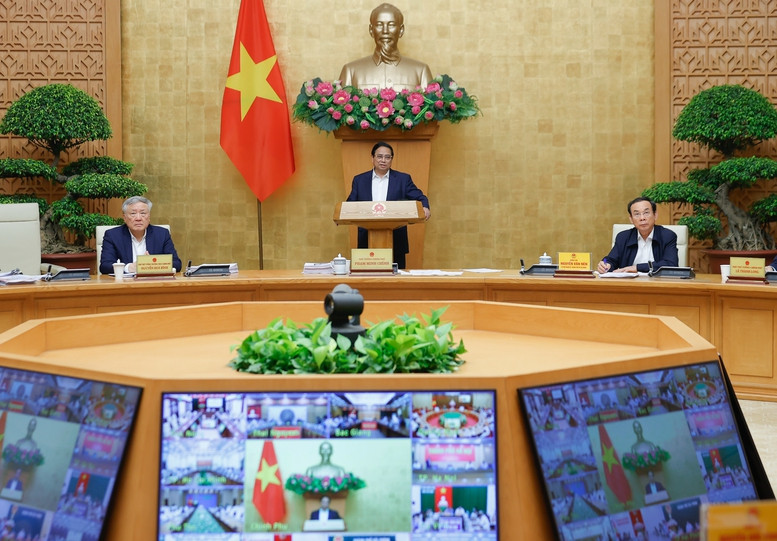Prime Minister Pham Minh Chinh has emphasized Vietnam's respect for and commitment to addressing U.S. concerns, affirming that Vietnam will engage in negotiations based on the high-level agreement reached between General Secretary To Lam and President Donald Trump.
This was the Prime Minister’s conclusion at the March regular government meeting and the national teleconference between the Government and localities, held on the morning of April 6.
Prime Minister Chinh stressed that Vietnam’s overarching goal remains unchanged: to ensure stability and development - both domestically and internationally. This includes maintaining a growth target of at least 8%, while stabilizing the macroeconomy, controlling inflation, ensuring key economic balances, and safeguarding social welfare and people’s livelihoods.
Staying calm and proactive in response to foreign policy shifts
Regarding responses to foreign trade policies, particularly the U.S.’s retaliatory tariffs, the Prime Minister underlined the importance of composure. He emphasized the need for calm, strategic, timely, and effective action, driven by resilience, intelligence, and flexibility.
He directed all stakeholders to assess the situation thoroughly and develop both immediate and long-term plans, covering tariff and non-tariff measures, commercial and non-commercial solutions, to form a strategic and comprehensive response.
Prime Minister Chinh also emphasized adhering to the guidance of the Central Committee, the Politburo, the Secretariat, and General Secretary To Lam. He called the current challenge an opportunity to restructure the economy, diversify markets, production, and exports.
“Exports are a key driver of growth and must be promoted, but they are not the only one. The U.S. is our largest export market, but not the only one,” he stated.
He reaffirmed Vietnam’s willingness to address U.S. concerns and to negotiate based on the high-level dialogue between General Secretary To Lam and President Trump.
Vietnam intends to place its economic and trade relationship with the U.S. within the broader context of its international economic relations - especially with countries that have signed free trade agreements with Vietnam - and under the principle of prioritizing national interests and balancing benefits while sharing risks with partners.
Detailed negotiations and comprehensive reform
The Prime Minister instructed Deputy Prime Minister Ho Duc Phoc and relevant agencies to thoroughly review and prepare specific negotiation plans with the U.S. Deputy Prime Minister Bui Thanh Son and the task force are to coordinate closely with the negotiation delegation and implement concrete tasks and measures across all sectors.
The Ministry of Finance, Ministry of Industry and Trade, and other ministries and local authorities were directed to immediately resolve existing difficulties, creating favorable conditions for all foreign enterprises, especially U.S. businesses.
They were also asked to engage proactively with business associations and major corporations, offer effective policy support, and provide transparent, timely responses to U.S. concerns - particularly on issues such as intellectual property rights and origin fraud.
Ensuring continuity, reforming governance, improving efficiency
Another key task mentioned by the Prime Minister is institutional reform. He called for streamlining organizational structures and redrawing administrative boundaries to create a more efficient two-tier government model. He also urged accelerated administrative reform and digital transformation.
The Ministry of Justice and other relevant agencies were tasked with implementing laws and resolutions passed during the National Assembly’s recent extraordinary session. More than 40 legal projects are expected to be reviewed and submitted at the upcoming ninth session.
The Ministry of Home Affairs was assigned to oversee the reorganization of government bodies, ensuring seamless operations and minimal disruption for citizens and businesses.
Each ministry, agency, and locality must develop specific action plans to review and improve institutional frameworks, reform administrative procedures, and enhance the investment and business environment.
The Prime Minister set measurable targets for 2025: reduce administrative processing times by at least 30%, cut business costs by at least 30%, eliminate at least 30% of business conditions, and ensure 100% of administrative procedures are independent of provincial boundaries.
Reports and opinions presented at the meeting noted that the socio-economic situation in each successive month has improved over the previous one, and Q1 2025 outperformed the same period last year.
Growth-leading provinces posted impressive figures, with Ho Chi Minh City up 7.51%, Hanoi up 7.35%, and nine localities achieving double-digit growth.
Vietnam’s macroeconomic stability and inflation control were praised. In March, the country’s total import-export turnover exceeded 75 billion USD, up 18.2% from February and 16.6% year-on-year.
The World Bank forecasts Vietnam’s economic growth at 6.8% for 2025, while the United Nations predicts 6.6% - the highest in Southeast Asia.
Social welfare has also improved. In Q1, 96.4% of households reported stable or higher incomes compared to the same period last year, and average worker income reached 8.3 million VND (approximately 328 USD) per month, up 9.5% year-on-year.
Notably, Vietnam’s Happiness Index ranking rose by 8 spots in 2025, placing 46th globally and second in Southeast Asia - just behind Singapore.
The Vinh
